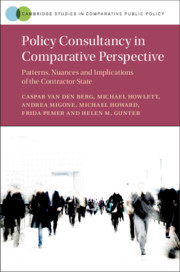 Policy Consultancy in Comparative Perspective
Policy Consultancy in Comparative Perspective Book contents
- Policy Consultancy in Comparative Perspective
- Cambridge Studies in Comparative Public Policy
- Policy Consultancy in Comparative Perspective
- Copyright page
- Contents
- Figures
- Tables
- Author Biographies
- Acknowledgements
- Abbreviations
- 1 Policy Consultancy in Comparative Perspective
- 2 Consultancy in the UK Government: Modernizing Privatism
- 3 Policy Consulting in the USA: Significant but in Decline?
- 4 Entrenched and Escalating: Policy-Relevant Consulting and Contracting in Australia, 1987–2017
- 5 From Corporatist to Contractor State? Policy Consulting in the Netherlands
- 6 Policy Consultants for Substance and Process: A Review of the Supply and Demand for Canadian Policy Consulting
- 7 Swedish Government Agencies’ Hiring of Policy Consultants: A Phenomenon of Increased Magnitude and Importance?
- 8 Conclusion: Policy Consulting in Comparative Perspective
- Book part
- References
- Index
2 - Consultancy in the UK Government: Modernizing Privatism
Published online by Cambridge University Press: 09 December 2019
- Policy Consultancy in Comparative Perspective
- Cambridge Studies in Comparative Public Policy
- Policy Consultancy in Comparative Perspective
- Copyright page
- Contents
- Figures
- Tables
- Author Biographies
- Acknowledgements
- Abbreviations
- 1 Policy Consultancy in Comparative Perspective
- 2 Consultancy in the UK Government: Modernizing Privatism
- 3 Policy Consulting in the USA: Significant but in Decline?
- 4 Entrenched and Escalating: Policy-Relevant Consulting and Contracting in Australia, 1987–2017
- 5 From Corporatist to Contractor State? Policy Consulting in the Netherlands
- 6 Policy Consultants for Substance and Process: A Review of the Supply and Demand for Canadian Policy Consulting
- 7 Swedish Government Agencies’ Hiring of Policy Consultants: A Phenomenon of Increased Magnitude and Importance?
- 8 Conclusion: Policy Consulting in Comparative Perspective
- Book part
- References
- Index
Summary
Demands made by the UK government for external policy support are big business, where the highest spend on consultants has been calculated at £2 billion in 2003–2004 (NAO 2006), and currently major consultancy firms are active in bidding for six months of Brexit work with a price tag of £1.5 million (Martin 2017). At the same time, the focus has been on review and retrenchment, with a fall in spending to £1.8b in 2005–2006 (NAO 2006), whereby ‘the government is determined to make every taxpayer penny count’ and the ‘Cabinet Office is working to help departments reduce reliance on everything from expensive consultants to print cartridges’ (Gov.uk ). Thus, it seems there is recognition of a contribution to public policy that is beyond ‘in-house’ capacity: ‘when used correctly and in the appropriate circumstances … [they] … can provide great benefit to clients – achieving things that clients do not have the capacity or capability to do themselves’ (NAO 2006: 4).
- Type
- Chapter
- Information
- Policy Consultancy in Comparative PerspectivePatterns, Nuances and Implications of the Contractor State, pp. 20 - 51Publisher: Cambridge University PressPrint publication year: 2019


